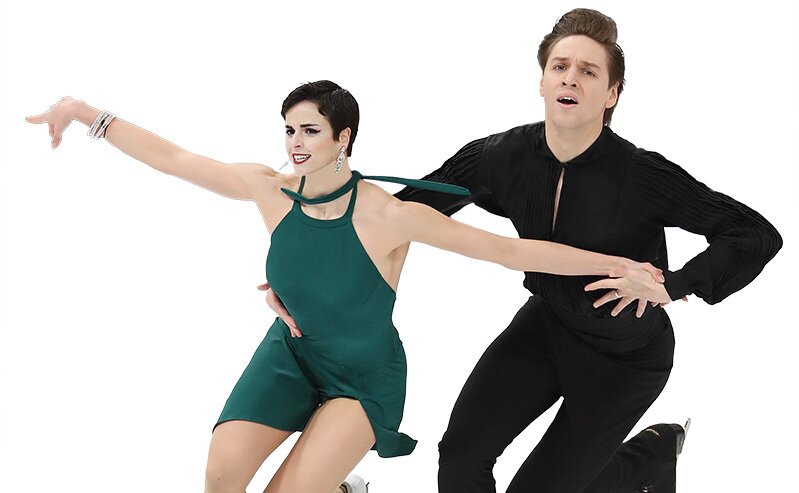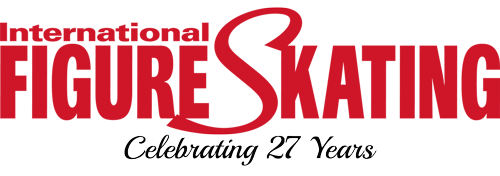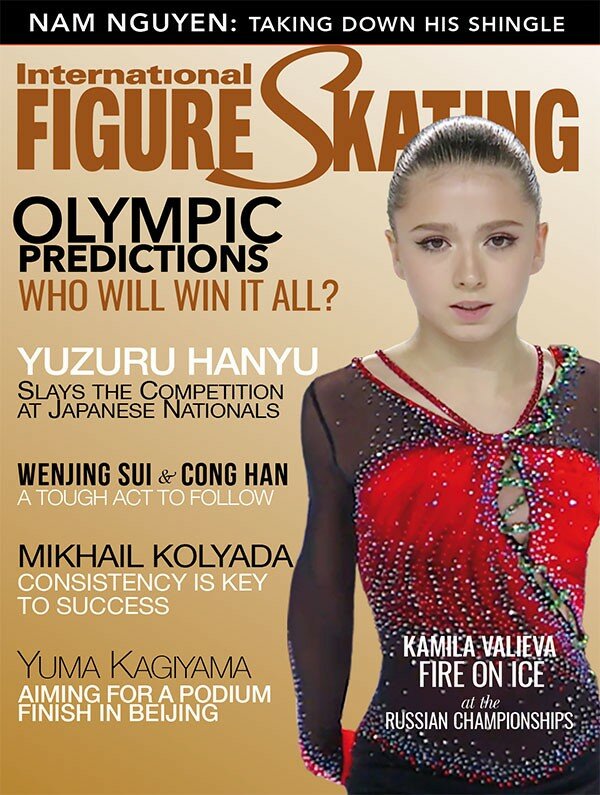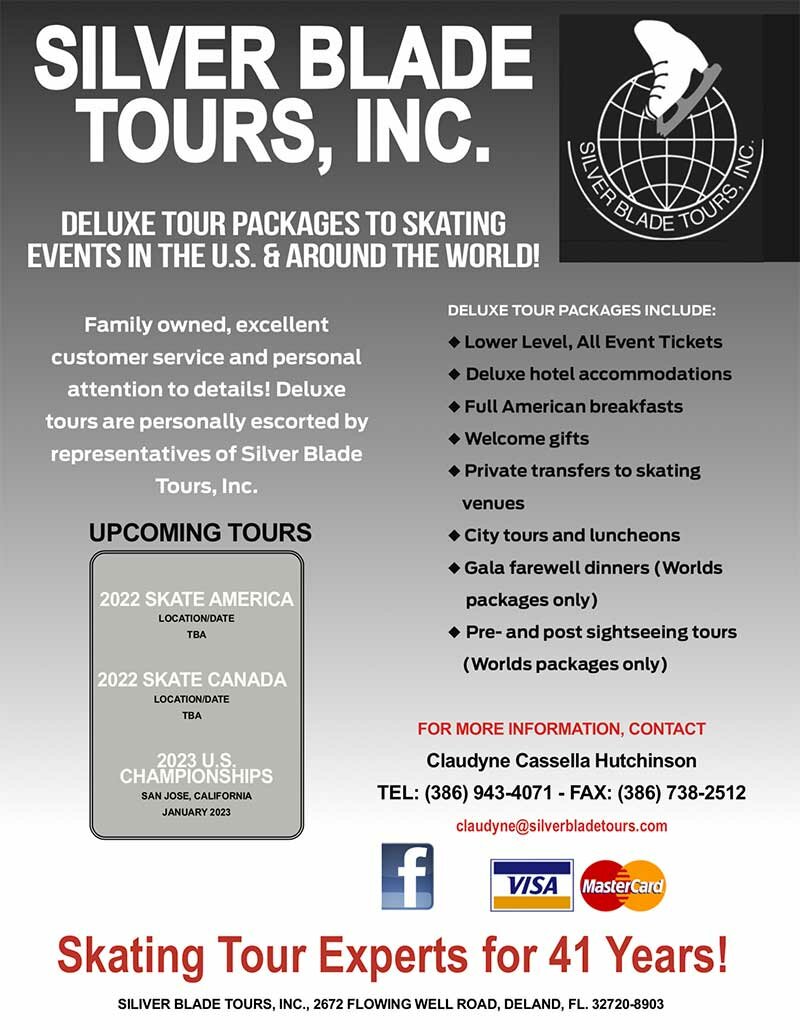

Photo: Robin Ritoss
It was a season like no other for Spanish ice dancers Sara Hurtado and Kirill Khaliavin. Following a three-month lockdown in Moscow, where they are based, Hurtado suffered a serious shoulder injury just weeks after returning to training in July. The subsequent surgery and rehabilitation kept her off the ice until December, which forced them to miss the Grand Prix in Russia, their only event of the year.
The 2021 World Championships would be their only competition of the season.
Where were you when the pandemic first began in March 2020?
Hurtado: I had a sponsor event with an energy company in Spain that supports female sports, so I found myself in Pontevedra (a city in the northwest) celebrating International Women’s Day, out in the open with many people gathered around doing activities.
The next day I went to Moscow and straight into quarantine at my home. First I had to stay for 15 days since I came from a foreign country and then I got the timing “just right” to have to stay home when the whole country went into lockdown.
So, in the end, I was home from March 9 until early July. To recall it now, I never thought I would live through anything like that. It was definitely a challenge to stay home alone, away from my family. I got through it and stayed sane and healthy and I think it was my biggest achievement of the whole COVID situation.
Khaliavin: My wife and me were in Moscow preparing to become parents. Also, at the ice rink we were thinking about new programs and working on our normal schedule. Then Sara went to Madrid and after that everything went like a snowball. She came back, did the quarantine and right after that everything closed so fast — ice rinks, public places, everything! So we missed even more time than we should.
I was at home almost 24/7, only going to the grocery store and taking short walks outside the apartment. At home I was doing cardio, reading books, watching movies and playing video games. I think it was a pretty common routine for athletes during that period of time. Also, we were cooking some new dishes from the Gordon Ramsay show and studying some Spanish.
I don’t remember the exact dates the rink was closed, but in Russia everything closed later than the rest of the world. Nobody knew for how long — the approximate month for opening was July — but we started to skate a bit earlier.
Sara, can you tell us about the shoulder injury you suffered last summer and what was the surgery you had?
Honestly, it was what you could consider a simple fall, but the way my right arm was placed, it couldn’t have gone any other way. We were doing a little gliding transition — something we have done like 500 million times with no problem. I had my arm stretched out and somehow we lost our footing and when I hit the ice, I absorbed all our weight on my shoulder, which couldn’t hold it and it popped out. It looked like something I described as being like an “earring.”
At first I thought I could put it back myself, but then the pain was so severe I knew something bad had happened. Thankfully, Kirill and the coaches reacted quickly and I was able to get to a hospital really fast so a specialist could put it back in place.
That action, to get it back in place, was crucial. If not, I would have needed surgery straight away. I was able to do all the tests in Moscow, but decided with my doctors that the best thing was to go back to Madrid and have an arthroscopic specialist fix it, so the recovery would be as fast as possible.
My labrum (the cartilage in the shoulder that holds everything together) broke in two different places, plus a part of it was out and turned upside down. It was quite the damage. But honestly, the surgeon and my team of physiotherapists made it all super easy to understand and helped me get the confidence that I was going to get my shoulder back.
Trust me, I replayed it in my head way too many times trying to find an explanation for it, and there is none. It happened how it happened and as I was so close to the ice I couldn’t have adapted any other way.
How long was the recovery process?
First it was a period of immobilization. It was quite funny that I learned how to do everything with my left hand, like brushing my teeth. Then I started moving it with assistance — gaining range of movement has never been as painful as that was — and then I was allowed to start moving it on my own. It felt like my arm weighed 100 kilos.
It took three months until I was able to skate again, but even then I wasn’t allowed to make fast moves or raise my arm higher than my head.
I didn’t have the strength or flexibility until months later. It definitely was the worst injury I have had in my career. Imagine, the fall was July 14, only a few weeks after the end of the lockdown and I was not back in Moscow until December 1.
I have never been off the ice for so long since I was 8 years old. It made me look at skating and life in a much different way. This year has made me appreciate every moment I have on the ice like the gift that it is.
At the end of the day, I am extremely fortunate to be doing what I do, so not enjoying it would be a mistake.
Kirill, you have trained with Alexander Zhulin for nine years with two different partners. How has your relationship evolved over the years?
It has been such a long time! OMG! I think he just needs less time to explain things on the ice to me now. And he definitely gives us more freedom to choose between the options and to propose options for our team.
Sara, how different are Zhulin’s methods to those of the Canadian coaches you formerly trained with?
Well, it is hard to compare. Basically, Kirill’s and my own needs are different to what my former partner and I needed back in the day, so therefore the work we have to do and the way we have to organize it is by essence not the same. Also, at the level we are at, any team of coaches is going to ask the best of you, so in that sense it is quite similar, maybe only the language is what changed the most.
I am really happy with what I found here in Moscow with Sasha and the other coaches. They are more than a coaching team — they are family now. It is not the same as when you are used to a country where you have lived forever because you don’t encounter the same difficulties.
But, any difficulties I may encounter, they are always there for me. They eliminated all the prejudices I brought with me from the western European world about how Russian people are cold and distant. They even say “Buenos Días” every morning when they see me.
Sara, how do you like living in Moscow and what do you miss about Spain?
Honestly, I do like Moscow. Of course wintertime is hard, basically because of the few hours of sunlight we get, but the city is something to discover and always full of life. Even when it is minus 24 degrees, people don’t stop.
Also, I love the way they celebrate their art and culture as much as they celebrate their athletes. It is impressive to see how strong they live these things. It really inspires me in many ways and I admire them for that. Not every country places so much importance on their art, culture and sport.
I do miss the light in Spain. As I said before, the months of dark skies at 4 p.m. are tough. I don’t mind the cold that much, but the difference in the light exposure I do feel. Also I miss my family and friends, of course, and things like peaches and my brother’s food (he is a chef ).
Kirill, it has been 10 years since you and your wife Ksenia Monko won the World Junior title. What motivated you to continue competing after she retired?
It’s just what I really love to do — skating, preparing for competitions, getting better as a skater and as a team, doing interesting programs and reaching new milestones. I have a great partner who shares my passion in all these things. And every season we put a bit of our souls into our programs. It is a very simple reason, but it is what it is.
Now that you have a child, how has this changed your outlook on life?
I am just trying to be more responsible now, to be a better person and a good role model for my son. And to be more open to the world and the things I really love.
Do you think that you and Ksenia will encourage your son to become a competitive skater?
We definitely will not force him to do this. It should be his decision. We will encourage him to choose things he will really love to do in his life.
Sara, how is your Russian coming along?
Chut (a little) LOL. That is my weak spot. For the past years I have said, “This year I will learn” and it hasn’t happened yet. But I do understand it enough to get around. For example, when the guys speak Russian in the dressing room, I end up joining the conversation and answering in English.
And how is your Spanish at this point, Kirill?
Ksenia and me did a really good job during the quarantine. Now it is a bit of a pause because we have less free time, but we are on a mission and hopefully next time in Madrid, I will speak Spanish the whole time.
Kirill, after the 2018 Olympics, you met the King and Queen of Spain. Was that your first royal encounter?
Yes, it was my first time. It was such a big honor for us and for me personally. Actually, I was a bit shocked when Sara told me and a bit stressed because my Spanish was really poor. We were joking that I needed just half a year of being Spanish and now I have an audience with the King and Queen. But seriously, they are both really kind people and it was a great pleasure and honor to be there.
How did you feel about the “bubble” concept at the 2021 World Championships?
Hurtado/Khaliavin: I think we were all just extremely happy to be competing, even though it meant no audience. We knew the situation demanded those measures and of course everybody’s health comes before anything else.
What was it like competing without an audience?
Hurtado/Khaliavin: There was probably a quarter of an audience. The other skaters made sure there was some noise when our names were announced. But yeah, all in all, it was strange. The feedback of the public is what makes the magic happen and we definitely missed that.
The competition was weird, of course, only performing for the judges and other teammates, but I have to say the figure skating family showed their true heart, supporting each other as they did.
We would all gather in the athlete seats and cheer our hearts out for the other teams so we all could get a closer feeling to the real thing. Yes, we are all competitors and we all want to win, but first we are humans all going through a difficult situation and that brought us together.
What activities were made available at the hotel for skaters to relax and what did you do?
Hurtado: They had an open rooftop for us to get some fresh air; there was a ping pong table, a room with some other video games and amenities. In that way, the organization was on point. Overall, I think they did a great job to accommodate all the safety measures to keep us safe, but in a way that we felt comfortable.
Khaliavin: I was only in my room playing PlayStation in my free time and sometimes watching the competition from the restaurant windows or team seats.
Have you decided on music for next season’s programs and who will choreograph them?
Hurtado/Khaliavin: Yes we have! It was harder than in other years — maybe because we were out of the rhythm of creating something new. But as always, it has been a fun process. It is one of our favorite parts of this sport, when you get to build something from zero and make it your own personal message to the world.
This year we want to make the music a surprise. The programs are in styles we have never done before, so we will try to pull the surprise factor here and hopefully you will like them. We are working with a super dancer, Aykhan Shinzhin. He won the Russian “So You Think You Can Dance” show and we connected with him from the first class. At first it was only going to be the rhythm dance with him. But since he is a multi-discipline dancer and choreographer and he is so good at it, we presented our idea for the free dance to him and he created that as well. We are very excited to have him on our team this year.
As Spain only has one ice dance berth at the 2022 Olympic Winter Games, how it will be decided which team will get the spot?
Hurtado: It still has not been decided. We are all waiting to hear the criteria from the federation. We can only prepare for every possible scenario the best we can and hope for the best. I think it is great that Spain has two good ice dance teams and there’s actually a competition inside the country. I hope this can continue through the next generations so the excitement and the expectation about Spanish ice dance never stops.
Aside from earning the Olympic berth, what are your other goals for the upcoming season?
Hurtado: Giving our all and enjoying every moment that comes with it. It is as simple and as complicated as that. Kirill and I are a team that thrives on personal growth. We don’t look for points or placements, we look for the best versions of ourselves that eventually will give us those points and placements and this season is no different in that way. Simply the motivation is greater knowing what is at stake.
Khaliavin: Just doing our best trying to grow in the directions we want to.
Will this be your final season or are you planning to continue beyond the 2022 campaign?
Hurtado/Khaliavin: We prefer to take it one step at a time. We don’t want to make any decision too soon but, being realistic, we both have had long careers in this sport and maybe the time has come to move on to something else.
What do you plan to do when you do retire from skating?
Hurtado: I have a full list of things I want to do. The hard part is going to be to decide! I want to have an ice dance school in Madrid; I want to produce a show, design my own line of sports clothes and write a book. Many things!
I am really grateful for everything this sport has given me, and thanks to that I have met many people, learned new skills and had experiences that not every person can have. In that way, I know I am ready for anything that comes next because I have people I can call on for help. I have failed so many times, I know it is the only way to grow and create the life of your dreams and I trust my abilities.
Khaliavin: Well, you never know how it will twist and turn, but it will be something to do with figure skating for sure.

RELATED CONTENT:
2021 GRAND PRIX SERIES
2021 CHALLENGER SERIES



